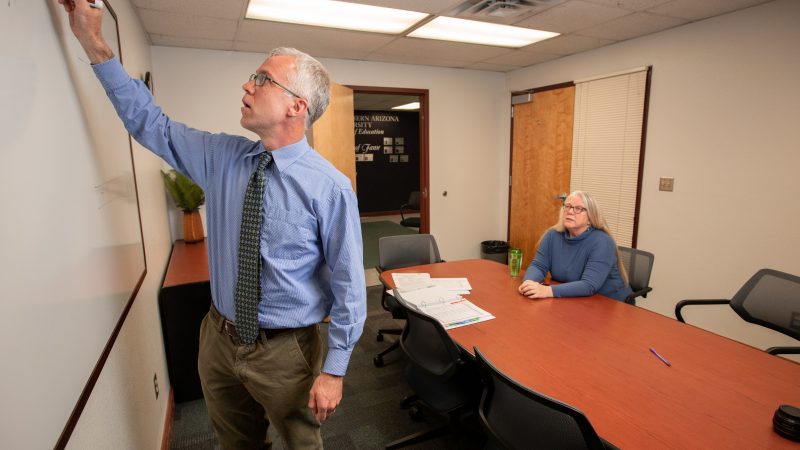Community health workers
Community health workers (CHW) are effective, frontline public health workers who are trusted members of vulnerable populations because they share the same ethnicity, language, and life experiences as the communities they serve.
CHWs are known by many titles:
- Promotores de salud (promotores) who represent and serve Latino/a communities
- Community health representatives (CHRs) who represent and serve primarily American Indian and Alaskan Native communities
The Institute of Medicine and the Community Preventive Services Task Force conclude that CHWs are effective and contribute to patient and community-centered coordination between social supports and primary care through community outreach, wellness education, and disease management.
CHWs’ core competencies of social support, capacity building, and advocacy also improve the social determinants of health, such as housing, food security and social connectedness, which are predictive of enhanced quality of life and health outcomes for all people.
By utilizing their unique position within the community, coupled with skills and training, CHWs build health equity—vital to our mission at the Center for Health Equity Research.
What is a community health representative (CHR)?
Community health representatives (CHRs) are tribally employed, and function as the oldest and only federally funded CHW workforce in the country. Learn about their work and a new project called the Community Health Representative Workforce Integration in Tribal Health Systems to Address COVID-19—CHR WITH uS!

Advocacy and policy
Center for Health Equity Research (CHER) researchers are dedicated to advancing and sustaining the CHW workforce locally and nationally through research, advocacy and policy. To do so, we engage in several collaborative efforts.
Board Membership, Arizona Community Health Worker Association (AzCHOW)
AzCHOW is a statewide organization of community-based advocates. AzCHOW provides an opportunity for community health workers (CHWs) to speak with a collective voice, and has been advocating for the work of CHWs in Arizona since 2001. We lead through resource sharing, partnership development, education, outreach, health promotion, and disease prevention strategies to improve the health of Arizona residents.
Board Membership, Community Health Representative Coalition (CHRC)
The CHR Coalition is a long-standing collaborative with a five-year history of partnered efforts to understand, strengthen, and sustain the CHR workforce and improve American Indian health.
Partners possess professional training, organizational missions, and stakeholder networks within academia, service delivery, assessment, and policy, inclusive of health department leadership of 22 Arizona Tribes and 19 CHR programs.
Since 2015, and in response to state and national CHW workforce policy trends towards standardization and certification, coalition members collaborate to plan and implement annual CHR Policy Summits and Workforce Conferences. Policy Summits create the space for CHRs and CHR stakeholders in research, healthcare, policy, and payers to dialogue and plan for the unique issues and opportunities facing CHR workforce sustainability and advancement, including federal shifts to eliminate the program entirely. Policy summit planning has resulted in the formation of the Arizona CHR Workforce Coalition, which meets monthly to plan and advocate for inclusion of CHRs in state and national level dialogue.
Board Membership, Arizona Community Health Worker Coalition
The Arizona Community Health Worker Workforce Coalition is a network of organizations collaborating with the Arizona Community Health Worker Outreach Network (AzCHOW) to support the sustainability of the Arizona CHW workforce.
The coalition is comprised of CHWs, including Promotores de Salud, community health representatives, community health advisors, other related titles, University of Arizona, Arizona State University, Northern Arizona University, state and local health departments, community health centers, community colleges, not for profit organizations, and area health education centers.
Dr. Samantha Sabo is a founding and active member of the coalitions and serves as the AzCHOW secretary.

Research and evaluation
In response to shifts supporting the integration of the community health worker (CHW) workforce into public health and health care systems, the Center for Health Equity Research at Northern Arizona University interviewed leadership of all Arizona Health Care Cost Containment System (AHCCCS) contracted health plans to assess innovations in CHW workforce integration and financing. Read the finding Community Health Worker Workforce: Assessment of the Integration and Financing of Community Health Workers within Arizona Medicaid Health Plans.
Community Health Representative Workforce
2019 Community Health Representative Workforce Assessment (Phase I)
Since 2015, community and academic partners of the Northern Arizona University Center for Health Equity Research (NAU CHER), the Arizona Advisory Council on Indian Health Care (AACIHC), the Inter-Tribal Council of Arizona Tribal Epidemiology Center (ITCA TEC), the Phoenix Area Indian Health Service (PAIHS), and over 20 Tribal health department and CHR programs have come together to produce seminal CHR workforce studies.
2019 Community Health Representative Workforce Assessment (Phase II)
In phase II of the CHR Workforce Assessment, NAU-CHER consultants again collaborated with the AACIHC to develop and conduct interviews with CHR managers in Arizona, focusing on CHR program organization,
structure, financing, health system integration, and evaluation.

Health Start Program evaluation
Researchers at CHER are evaluating Arizona’s Health Start Program, a statewide CHW maternal and child health home visiting program. The purpose of the evaluation is to assess the impact of the Health Start Program on maternal and child health outcomes (e.g., birth outcomes, prenatal care, early childhood vaccinations). The team hopes the results will contribute to the designation of Health Start as an evidence-based program. Learn more about the Health Start Program Evaluation and review the Impact report.
In the media
- New Tools Created to Promote Community Health Representative Integration in Emergency Preparedness and Vaccine Deployment (Nov. 15, 2023)
- CDC Awards $6 million to Arizona Tribal Community Health Representative Program (May 8, 2023)
- Supporting CHWs with resources and training (May 8, 2023)
- NAU team part of grant to support community health representatives (Apr. 29, 2023, AZ Daily Sun)
- Arizona moves toward reimbursing community health workers through Medicaid (Nov. 10, 2022)
- Arizona researchers find community health workers improve health for mothers and babies (March 7, 2022, NAU Review)
- Workshop explores the power and promise of community health workers (May 19, 2022)
- Report highlights ID-19 experiences of community health workers (July 20, 2021)
- Community health workers improve birthweight of newborns through the Arizona Health Start Program, researchers find (June 24, 2022 NAU Review)
- Community health workers improve birthweight of newborns through Arizona Health Start Program, researchers find (June 22, 2021)
- NAU report finds community health reps, who provide critical services to Native Americans, need more support (Dec. 15, 2020 NAU Review)
Publications
Webinars
Resources
- CHR Integration: Public health emergency preparedness and response tool no. 1
- CHR Integration: Vaccine deployment tool no. 2
- CHW workforce collaborative publications
Note: This page contains PDF documents that are currently in the process of being made fully accessible for all users. If you need assistance with accessible documents in the meantime, please contact Disability Resources.
